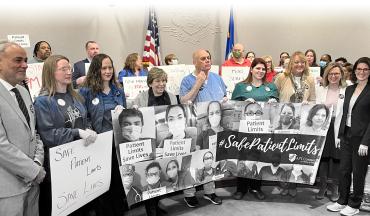This year, three states have made great strides toward ensuring patient safety and high-quality care by passing laws to tackle the long-standing issue of unsafe staffing levels in hospitals. Legislators in Connecticut, Oregon and Washington stepped up to the plate in response to rising pressure from healthcare professionals, patients and their families, passing historic legislation to address this issue head-on. These successes were made possible partly by the hard work of AFT’s nurses and health professionals, who bravely shared their experiences, took to social media, contacted their legislators, and demanded action to solve the burnout and staffing issues.
In addition, earlier this year, the AFT launched the “Code Red: Understaffing = Patient Care Crisis” national campaign to shed light on and resolve the country’s dire healthcare staffing crisis. This campaign holds healthcare corporations and the government accountable through education, outreach, advocacy, contract bargaining and legislation.
The sweep of state legislative wins by AFT healthcare affiliates this year is one of the most substantial efforts to secure staffing protections since 2004 when California enacted minimum nurse-to-patient ratios. Oregon’s legislation goes even further than California’s staffing laws, with numerical minimum safe staffing ratios for nurses to patients in hospital settings by unit. The bill also expands Oregon’s staffing committee structure to include service, technical and professional allied healthcare workers, and requires the state to enforce the staffing law—including for missed meal and rest breaks. Once the bill is signed by Gov. Tina Kotek, hospitals must comply with the nurse-to-patient ratios on June 1, 2024, and the new staffing committees must be set up on or before Dec. 31, 2024. Increased mandatory state enforcement begins June 1, 2025.
“Safe staffing is at the heart of every single thing ONA does,” says Tamie Cline, RN and president of the Oregon Nurses Association. “It is our guiding principle, the focal point of our work, and our ultimate goal. This victory in the Oregon Legislature is just one piece of a much larger effort, which includes our work at bargaining tables across the state.”
“We are excited to see that Oregon is taking steps toward addressing the biggest crisis facing healthcare professionals today: short staffing,” says Jonathon Baker, president of the Oregon Federation of Nurses and Health Professionals. “The success of this legislation shows that we can change our healthcare system for the better when we come together and act in solidarity.”
In Connecticut, AFT Connecticut’s nurses and health professionals lobbied for proposals to address unsafe staffing, establish safe patient limits and protect vital health services in the state. The caregivers’ efforts achieved legislation signed into law to help ensure nurses and health professionals have a stronger voice in establishing their facilities’ staffing plans and remove mandatory overtime language from union contracts. Both provisions have been a top priority for union activists, workplace safety watchdogs and patient care advocates at the state and national levels for years.
“Lawmakers and Gov. Lamont heard us. This budget sides with the dedicated workers sounding the alarm, not the corporations that have eroded protections in the name of record revenue, says AFT Connecticut Vice President John Brady, who is a registered nurse. “We’ve said over and over that these problems are fixable but that employers won’t fix it themselves: Today the governor decided it was time, finally, to help the helpers. Our union members have been advocating safe patient limits for years; adoption of these protections into law makes that goal achievable.”
In Washington state, Gov. Jay Inslee signed a safe staffing bill to improve working conditions for nurses and healthcare workers throughout the state. The law creates meaningful progress toward safer staffing and better hospital accountability. Among many other things, it will strengthen accountability for complying with hospital staffing plans set by staffing committees; eliminate CEO veto power over those plans; and create uniform reporting forms, meaning that patients and healthcare workers can more easily understand how many staff should be present.
Healthcare staffing legislation remains under consideration in several other state legislatures, including Alaska, New Jersey, New Mexico, Ohio and Wisconsin. Meanwhile, the push for federal action continues with the reintroduction of the Nurse Staffing Standards for Hospital Patient Safety and Quality Care Act. The bill mandates that hospitals develop staffing plans based on the acuity and needs of patients, going beyond the traditional head-count approach. The legislation also includes provisions for a whistleblower protection program, offering safeguards for healthcare workers reporting staffing violations.
[Adrienne Coles]



